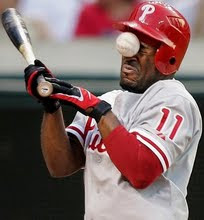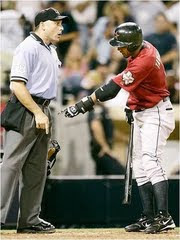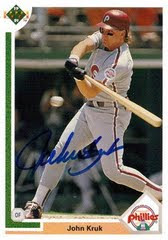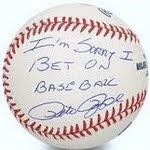Recently, someone in one of my fantasy leagues proclaimed that he felt David Wright was overrated*. His claim was that Wright never returned his draft day value, that he never lived up to expectations, that he is a perpetual injury risk, and that he was not worthy of a top 10, let alone first round, pick.
*This statement was made amidst trade talks, so perhaps the comments need to be taken with a grain of salt in light of the inevitable "all my players are awesome, while all of yours have some marked flaw" back-and-forth that predicates trading.
Naturally, I dismissed these claims as outrageous, but in trying to trade Wright at various points this season, I have perpetually encountered concern about his production potential and value as a real life and fantasy asset. It leads to me wonder whether Wright is being undervalued, or whether I have put the man who has been on each of my squads since I began playing fantasy on a nostalgic pedestal.
The first thing one might notice upon glancing at Wright's player stats page is his 162-game average pace numbers: 27 home runs, 22 stolen bases (to six caught stealing, for a 78.6 percent success rate), 103 runs, 107 RBI, .303/.382/.513 (.895 OPS, .386 wOBA, 137 wRC+).
While Wright has never played 162 games in a season, he did average 155.8 games between 2005 (his first full season as the Mets' starting third basemen) and 2010, including his concussion-shortened 2009 season (144 games played). From 2005 to 2010, Wright thrice played 160 games, appearing in 154 of the Mets' contests in each season other than 2009. In fact, Wright's first disabled list stint came in 2009, after he was beaned in the head by a 94 mph Matt Cain fastball—something you can hardly call a "chronic" health issue. Back problems are always a worry, but this is the first time Wright has had one, and his disabled list stint this year was only the second of his career.
So much for being a perpetual injury risk.
And what about his production? Is it overrated? Wright has exceeded the 162-game pace noted above only once in his career, in his 2007 30/30 campaign, but has produced at an elite level each season of his career.
Between 2005 and 2010, Wright hit fewer than 26 home runs only once—in 2009—and he stole 15 or more bases each of those six seasons. His career low batting average entering this season was .283, while it was only once under .300 before 2010, when he posted a .293 batting average in his inaugural season (2004).
In terms of Wright's relative value, among the 128 players to accrue enough plate appearances between 2005 and 2010 to qualify for at least one batting title, Wright's value over the average player value ranks fifth overall, with a 5.70 Z-Score. Only six players had a Z-Score of five or higher, and the four guys ranked ahead of Wright—Albert Pujols (8.91), Alex Rodriguez (6.72), Miguel Cabrera (6.23), Matt Holliday (5.73)—were undeniably better from 2005-2010 (though position was not considered for these crude Z-Scores). Furthermore, If you combine his partial 2004 season with his 2011 partial season (125 games played), Wright's composite line would be 23 home runs, 14 stolen bases, and a .283 batting average.
Perhaps it is unfair to combine Wright's first and last seasons, as he has been a different hitter since his injury, striking out more frequently and hitting for a little less power. Nonetheless, Wright's composite 2010 and 2011 numbers (212 games) are still quite strong. Since the beginning of 2010, Wright has hit .280/.354/.491 with 38 home runs and 28 stolen bases. That prorates to a 27.5 home run, 20.5 stolen base rate per 155 games played. Furthermore, Wright's walk rate of 10.7 percent in this span is not too far off his career 11.2 percent mark (11.8 percent 2011 mark).
Thus, even with "diminished" batting average and slightly down power (Wright averaged 29 home runs a season between 2005 and 2008, hitting 30-plus in 2007 and 2008), Wright's level of production has not diminished so far as to call his present production disappointing. Citi Field's effects must also be considered, as the park robbed Wright of at least six home runs in 2009.
Let's be realistic/pessimistic for a moment, and presume that Wright's present pace represents most of his true talent line going forward, and that his "true talent" line was "only" a .280/25/15 pace. Let's also ignore positional value, despite the scarcity of production at third base this season. How do those numbers stack up in fantasy?
From 2005 to 2010, only four players averaged 25-plus home runs and 15-plus stolen bases per season: Alex Rodriguez, Alfonso Soriano, Chase Utley and Wright. That is exclusive company.
More specifically, from 2005 to 2010, there were 57 individual seasons of 25 home runs and 15 steals, or just under 10 per season (some seasons had a couple more, some a couple less, but no season had more than 12 players hit 25/15). Of these 57, only 12 players owned more than one, while only three players (A-Rod, Soriano and Wright) could lay claim to three or more. Wright is the only player to post five 25/15 campaigns over that six-year span.
Even more interestingly, only 24 of those 57 25/15 campaigns involved a player posting a batting average of or above .300. Of those 24, four were turned in by Wright. If we try to stack "present Wright" batting average in the mix, he would still have a better batting average than 16 percent of our sample. You can investigate more 25/15 trends from 2005 to 2010 by clicking here (Excel file).
Balance is an underrated asset in fantasy baseball. Diversification, rather than absolution, mitigates risk by reducing the effect of disappointment by any single player. A squad of fantasy players that average 15+/15+ is just as capable of competing for a fantasy title as a team built with one- and two-trick ponies like Juan Pierre and Ichiro Suzuki. Brad Johnson's fantasy squad in The Hardball Times Fantasy League this year, and my various teams in other leagues, are living, present day testaments to this. The real difference between the two constructs is that the 15+/15+ team's first place dreams are probably not sunk when any single player goes down. Compare the effects of losing, and problems with replacing, a dud like Pierre (50-60 expected stolen bases) to replacing a random 15+/15+ player when the average major league hitter averages something like 12 home runs and nine stolen bases.
So what does this all mean? It means that Wright is not overrated. He is routinely one of only 10 players a season that you can bank on hitting 25 home runs and stealing 15 or more bases, while hitting .280 with batting average upside. In addition to elite production, Wright plays at one of baseball's increasingly premium fantasy positions—third base.
While his declining defense may be a concern for Mets fans, most fantasy formats do not consider defense, and there are no signs that Wright is ticketed to move off the hot corner. He is currently on pace for 25 homers and 25 steals per 155 games this season, and has been red hot since returning from the disabled list. All this after a bounce-back power season last year (29 home runs) after a disappointing longball output in 2009, which was arguably deflated by both park effects (Citi Field has since undergone substantial changes) and a fluke concussion caused by a man whose skill eludes sabermetricians.
So next time someone in your league tries to tell you David Wright is overrated, tell them they are wrong. Heck, try and trade for him if this myth is that permeating.
Is David Wright Overrated?
Posted by
David "MVP" Eckstein
on Wednesday, August 10, 2011
Labels:
David Wright,
Fantasy Outlook,
VORP







0 comments:
Post a Comment